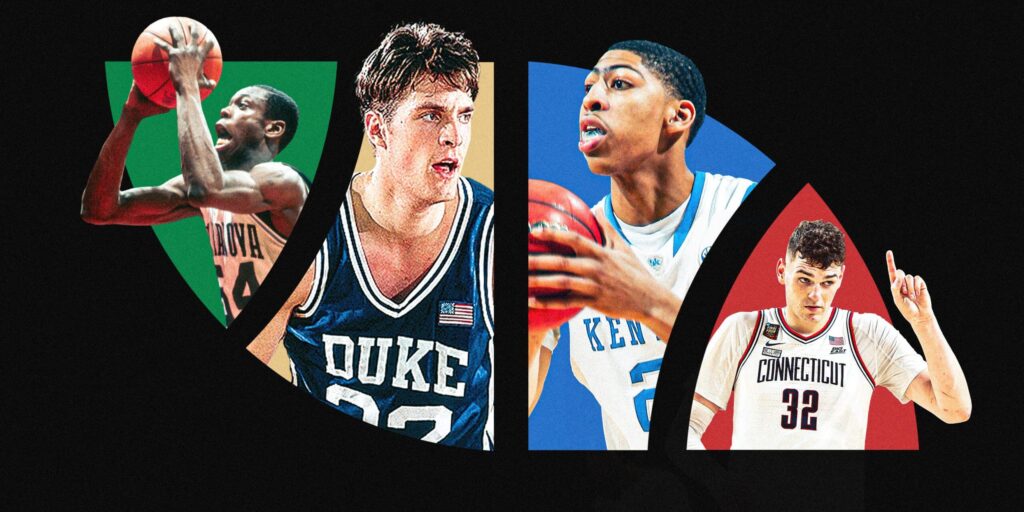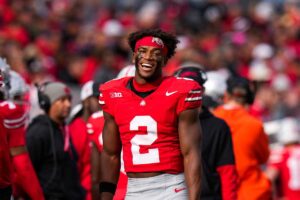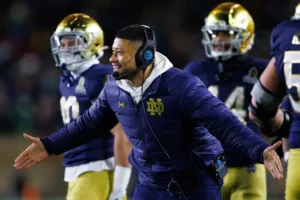
Duke University’s basketball program has long been synonymous with excellence, innovation, and success in the world of college hoops. Under the legendary leadership of Coach Mike Krzyzewski, Duke has solidified itself as one of the most storied and respected programs in NCAA history. With a record of consistently producing NBA talent, along with numerous ACC titles and NCAA tournament appearances, the Blue Devils have earned a place among the elite.
However, a new ranking of the greatest players to ever wear the Duke uniform has stirred the pot, generating passionate debates among fans, analysts, and former players alike. The ranking, which attempts to order Duke’s greatest athletes in terms of their college achievements, NBA potential, and overall impact on the program, has sparked a firestorm of opinions, with some praising the list while others vehemently disagree. This controversy is yet another reflection of how deeply basketball runs at Duke, where every move on the court, every accolade, and every new ranking is closely scrutinized.
In this article, we’ll take a look at the players who have defined Duke basketball over the years, examine the ranking that’s causing such a stir, and discuss why the Blue Devil program is considered one of the most respected—and occasionally controversial—teams in the NCAA.
A Tradition of Excellence
Duke basketball has not only won championships, but it has also been a breeding ground for future NBA stars. From the early days of the program to the current era, the Blue Devils have consistently ranked among the nation’s top teams. Coach Mike Krzyzewski, who took over the program in 1980, transformed it into a powerhouse. Under his leadership, Duke has won five NCAA championships (1991, 1992, 2001, 2010, and 2015) and produced more NBA talent than most other schools in the country.
It’s not just the wins that make Duke special—it’s the culture that Coach K built. The program’s emphasis on defense, teamwork, and player development has produced well-rounded athletes who often shine in the NBA. From Grant Hill, who became an NBA All-Star, to Kyrie Irving, who was drafted first overall, the Blue Devils have consistently produced top-tier talent. The team has also been known for producing both offensive and defensive juggernauts, such as Christian Laettner and Shane Battier, whose ability to lock down opponents made them college basketball legends.
Over the years, Duke has boasted an impressive list of former players who have achieved greatness both on and off the court. But in recent months, a new ranking of the top 10 greatest players in Duke history has sparked debate.
The Ranking That Stirred Debate
The latest ranking, compiled by a panel of former players, analysts, and coaches, aims to determine who the greatest Duke players of all time are. The ranking considers both their accomplishments at Duke and their success in the NBA. While this list undoubtedly reflects the incredible achievements of the players included, it also leaves many wondering whether certain choices were fair or if others were unfairly overlooked.
At the top of the list, you’ll find familiar names like Christian Laettner, Grant Hill, and Zion Williamson—players who were at the heart of Duke’s success. However, some players, such as J.J. Redick and Kyrie Irving, who have also left their mark both in college and in the NBA, found themselves in positions that raised eyebrows. While many fans were quick to defend their favorites, others questioned whether the ranking truly captured the impact of certain players during their college careers.
Laettner and Hill: The All-Time Greats
Christian Laettner, who played at Duke from 1988 to 1992, remains the program’s most iconic player. He led Duke to two NCAA championships, was a consensus All-American, and is widely regarded as one of the greatest college basketball players of all time. His performance in the 1992 NCAA Tournament, especially his game-winning shot against Kentucky in the “The Shot,” has become the stuff of legend.
Grant Hill, a two-time NCAA champion, was a dominant force for Duke during his time in Durham. Hill’s all-around game, leadership, and versatility helped define the Blue Devils’ success in the 1990s. After college, Hill went on to have a stellar NBA career, earning seven All-Star appearances and establishing himself as one of the most skilled forwards of his era. Hill’s success in both the NCAA and NBA helped cement his place as one of the greatest Blue Devils in history.
Zion Williamson: The Phenomenon
Zion Williamson, despite only spending one season at Duke, has become a lightning rod for debate. Williamson’s freshman year was nothing short of spectacular, as he averaged 22.6 points and 8.9 rebounds per game. His athleticism, strength, and jaw-dropping dunks captured the attention of fans and scouts alike. He single-handedly elevated Duke’s program during the 2018-2019 season and ultimately became the No. 1 pick in the 2019 NBA Draft.
However, despite his extraordinary talent, some critics argue that his relatively short tenure at Duke doesn’t give him the same legacy as some of the other players on the list who had long, successful careers in Durham. This has been one of the most contentious points of discussion surrounding the ranking—should a one-and-done player, no matter how transcendent, be ranked among Duke’s all-time greats?
J.J. Redick and Kyrie Irving: Snubbed?
J.J. Redick and Kyrie Irving, two of the program’s most successful players in the modern era, were also subjects of controversy in the ranking. Redick, Duke’s all-time leading scorer, was a dominant force during his tenure from 2002 to 2006, earning a national reputation for his scoring ability, particularly as a sharpshooter from beyond the arc. He led Duke to an NCAA Tournament title game and was the national Player of the Year in 2006. Despite his immense success at Duke and his solid NBA career, Redick’s placement on the list left many questioning whether he was ranked too low.
Kyrie Irving, on the other hand, is another player whose time at Duke was short but memorable. Irving’s freshman season was cut short by an injury, but in the brief time he was on the court, he displayed an incredible level of skill, showcasing his ability to dominate in ways that few players can. While his college career was brief, his impact was undeniable, and his NBA career has been nothing short of stellar, with multiple All-Star appearances and an NBA championship under his belt. However, some critics argued that his relatively small sample size at Duke should prevent him from being ranked higher than some of the program’s other all-time greats.
Why the Debate Matters
The debate over Duke’s greatest players is not just about ranking individual achievements; it’s about the culture and identity of Duke basketball itself. The Blue Devils are more than just a team—they are a dynasty, a program that has shaped the landscape of college basketball. Fans care deeply about the legacy of their program, and this ranking has brought to the surface many of the underlying tensions about what makes a player truly great.
Duke fans are passionate, and they view their players not just as athletes but as representatives of a long-standing tradition of excellence. Whether it’s a player who helped bring home a championship, one who put in four years of hard work, or a freshman who took the basketball world by storm, each player’s legacy contributes to the program’s rich history.
Moreover, the debate underscores how subjective these rankings can be. Is it more important to have a long and successful college career, or is a player’s raw talent and short-term dominance enough to secure their place among the program’s legends? The answer varies depending on who you ask, which is why the discussion surrounding Duke’s greatest players remains so vibrant and passionate.
A Legacy That Will Continue to Evolve
Duke’s basketball program is a living legacy, and as long as the Blue Devils remain competitive, the debate over who belongs on the list of all-time greats will continue to evolve. New players, like the young talents currently on the roster, may eventually push aside some of the former legends and take their place in Duke’s storied history. Yet, even as new stars shine, it’s clear that the program’s foundation will always be built on the iconic players who paved the way before them.
While the recent ranking of Duke’s greatest players may have sparked controversy, it also serves as a reminder of the program’s profound impact on college basketball and the lasting legacy of those who have donned the blue and white. In the end, the debates, the discussions, and the passionate fan base are what keep the Duke basketball story alive and well—one that will continue to be written by the players who make their mark both in Durham and beyond.





